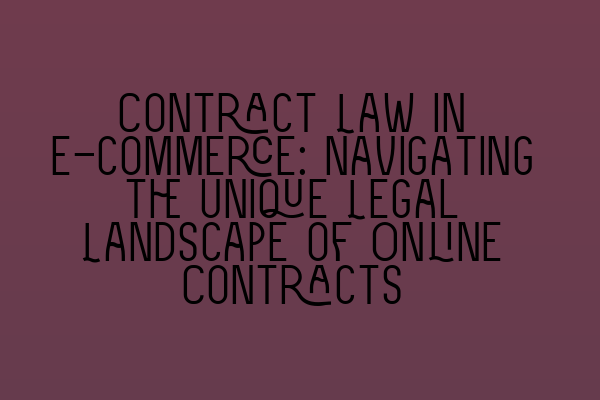Contract Law in E-commerce: Navigating the Unique Legal Landscape of Online Contracts
In today’s digital age, e-commerce has become a prominent force in the business world. With more and more transactions being conducted online, it is crucial for businesses to understand the legal framework surrounding online contracts. As a solicitor specializing in contract law, I aim to guide you through the unique legal landscape of online contracts and provide valuable insights to help you navigate this rapidly evolving domain.
The Rise of E-commerce and Its Legal Implications
Since the advent of the internet, e-commerce has revolutionized the way we conduct business. The convenience and accessibility it offers have propelled online shopping to new heights. However, with great convenience comes great responsibility. Online contracts bring their own set of legal implications that businesses must address to protect themselves and their customers.
Offer and Acceptance in the Online Realm
In traditional contract law, an offer is made by one party and accepted by another, resulting in a legally binding agreement. The online realm poses unique challenges to this fundamental principle. In e-commerce, offers are often made through website listings or product descriptions. Therefore, it’s essential for businesses to clearly outline the terms and conditions of their offers, including pricing, payment terms, and delivery information.
Acceptance of an offer in the online context can occur through various means, such as clicking “add to cart” or “buy now.” It is crucial to have a robust system in place to ensure that the offer and acceptance process is properly documented and can be easily verified in case of dispute.
Ensuring Online Contract Validity
To ensure the validity of online contracts, businesses must adhere to certain legal requirements. For instance, there must be a clear and mutual intention to create legal relations. This can be demonstrated through explicit statements on the website, such as “by placing an order, you agree to the terms and conditions.”
Furthermore, the concept of “click-wrap” agreements has gained prominence in online contracts. These agreements require users to actively click on a box or button to indicate their acceptance of the contract terms. Businesses should ensure that their click-wrap agreements are properly implemented and provide users with an opportunity to review the terms before accepting.
Mitigating Risks and Dispute Resolution
While businesses strive to create watertight contracts, disputes may still arise in the realm of e-commerce. It is essential to have mechanisms in place to mitigate risks and resolve disputes in a fair and efficient manner.
One effective approach is to include an arbitration clause in the online contracts. The clause can stipulate that any disputes will be resolved through arbitration, thereby avoiding costly and time-consuming litigation. Arbitration provides a more streamlined and private process, allowing parties to resolve their differences with the help of a neutral third party.
It is also important to ensure compliance with consumer protection laws and regulations. Consumer rights in the e-commerce context may include the right to cancel an order, receive a refund, or dispute unauthorized charges. By staying up to date on consumer protection laws and implementing fair and transparent practices, businesses can build trust and mitigate the risk of regulatory action.
Seeking Professional Guidance
Navigating the legal landscape of online contracts can be challenging, especially for businesses that are new to the e-commerce world. Seeking the guidance of a solicitor with expertise in contract law is highly recommended.
At SQE Contract Law, we have a team of experienced solicitors who can provide guidance on all aspects of e-commerce contracts. Whether you need assistance in drafting terms and conditions, reviewing existing agreements, or resolving disputes, our team is here to help.
To further explore the legal field and gain valuable insights, check out our related articles:
– Securing Training Contracts: A Roadmap to Becoming a Solicitor
– Mentorship for Aspiring Solicitors: Nurturing Talent in the Legal Field
– Legal Challenges and Pitfalls: Navigating the Complexities of the Legal System
– The GDL (Graduate Diploma in Law): A Pathway to Becoming a Solicitor
– Mastering the Solicitor’s Path: Prepare for the Journey Ahead
In conclusion, e-commerce has revolutionized the way we do business, and as a result, it has introduced unique legal challenges. Understanding the legal framework surrounding online contracts is crucial for businesses to protect themselves and their customers. By adhering to legal requirements, mitigating risks, and seeking professional guidance when needed, businesses can navigate the unique legal landscape of online contracts with confidence and ensure compliance with applicable laws and regulations.
